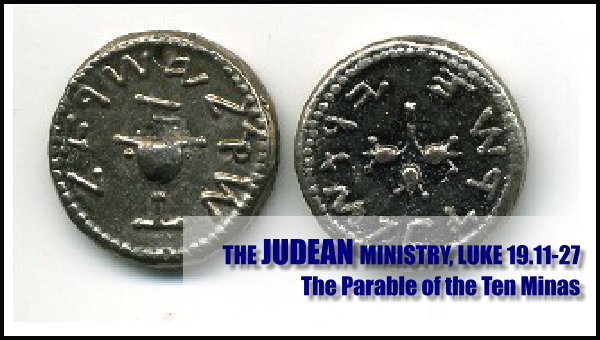By Tyson Thorne

The Judean Ministry at Various Cities (19.28-24.53), 19.11-27
This is the finale of Jesus’ teaching regarding the coming Kingdom. Closing in on Jerusalem and the fulfilment of his mission the Messiah knew that many, including the 12, still misunderstood what the Kingdom is, how it will be ushered in, and whom will enter it. While teaching about attitude and responsibility over the last few parables, this one gives the disciples (and us) insight into the Kingdom of God and its people. To understand these nuances, we must first understand who the characters in this story represent.
- The Man of Nobel Birth – Jesus.
Luke informs us that the people believed the Kingdom of God would be instituted immediately; to counter these notions Jesus begins his story about a Man of Nobel Birth who came from a distant kingdom to take rule of another land and then return to his kingdom. This informs his audience that the Kingdom of God will not be coming immediately, but rather at a later time. - The Servants – Those who claim allegiance to the Man of Nobel Birth.
The new ruler summoned three servants who would stay behind. He gave them 10 minas each – a sum equaling about three months’ wages for the average citizen – to manage until his return. - The Subjects – Religious leaders in particular.
The subjects, or citizens as some translate it, may also include the nation of Israel as a whole, and even the rest of the world. Either way, they disliked the Man of Nobel Birth intensely and did not want to be under his rule.
These are the characters and their circumstances. The Man of Noble Character returns to his homeland and receives the rights to the new land. How much time goes by before his return is not important to the story, but it must have been long enough that one of the servants did not believe the ruler was ever returning. This servant stored the money, not in a bank where it could earn anything but in a place where it could be accessed easily enough. Surely he knew better? He did.
Upon the king’s return the unfaithful servant was found out. His statement reveals he didn’t believe he was at fault and attempted to direct blame back on the king. “You are a severe man,” he began. “You withdraw what you did not deposit and reap what you did not sow.” In other words, “you don’t deserve what you have.” Whether the man was ever a dedicated servant to the king or decided to side with the locals is unknown, but at some point he turned on the king.
It should be a lesson to all believers, to never lose faith in the return of the king. Jesus is returning for his people one day even if we don’t know when. Our duty isn’t to try and uncover when that event will occur, but rather to serve faithfully until he returns – even as the faithful servants did.
The two faithful servants were rewarded and permitted to govern cities in the kingdom. In fact, the one who had produced the most profit was given the unfaithful servants share. There was some opposition to this, but why wouldn’t a king entrust extra funds to the one who had produced the most wealth so far? It isn’t about fairness or income equality; it is about how well one serves the concerns of the king. Perhaps we’ll publish an article soon about the implications of this truth to modern day economics.
The unfaithful servant, on the other hand, and all who opposed the king were rounded up and slaughtered. This is an obvious representation of the spiritual death that those who do not receive Jesus will endure. They are not to be pitied; it is justice served.
|
|